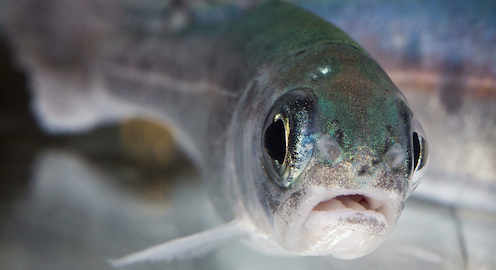
The use of antidepressant pills has become synonymous with improved mental health, quelling sometimes crippling anxiety, and altering energy levels and behaviour. They are heavily relied upon when treating depression and general anxiety disorder.
In the past 20 years, European nations have seen consumption rates of antidepressants more than double. Closer to home, their usage amongst Canadian youth is surging. In the shadow of the COVID-19 pandemic, these rates are only expected to rise, particularly when considering the affordability of and need for these medications.
However, many people are likely unaware of a hidden and perhaps surprising environmental cost associated with antidepressant usage. The rising use of antidepressants has led to a parallel spike in their presence in our ecosystems.
As a developmental toxicologist who has been studying the impact of our actions on aquatic life, I investigate the impacts of antidepressants on fish. Identifying and characterizing the potential damage to fish exposed to these neuroactive compounds is paramount for protecting the biodiversity of our aquatic ecosystems.
Table of Contents
Antidepressants and aquatic environments
Our bodies do not fully break down each pill we take and the by-products released from our bodies are often just as active as the original medication.
Our toilets carry these neuroactive ingredients that affect nervous systems into our wastewater. Despite best attempts to treat them, not all the components of antidepressants can be removed from our sewage.
So, treated municipal wastewater is released into our ecosystems, containing the remnants of antidepressants people consume.
Antidepressants are accumulating in our waterways today. They break down significantly slower than we replenish them, and the global scorecard shows that they have reached record levels.
Antidepressants and fish
Research has found the neuroactive compounds of antidepressants in the livers, brains and reproductive organs of various fish species.
These pills offer people balance and reprieve by altering their levels of neurotransmitters. These are signalling molecules in our bodies that orchestrate movement and regulate how our bodies perform daily activities.

(William Andrew Thompson), Author provided
Despite the glaring differences between humans and fish, the underpinnings of our physiology and neural networks share similarities. It’s not surprising that antidepressants affect fish in many ways, and the evidence suggests their impacts are specific to the life-stage of each fish.
Research has found that today’s environmental levels of antidepressants can alter fish behaviour. Changes in fish behaviour are significant because their ability to acquire food, seek shelter and breed requires nuanced movements. Even a small change in the delicate balance between the energy derived from food and that required to obtain it can have a huge impact.
Apart from fish behaviour, antidepressants alter systems necessary for species survival. For example, antidepressants that target serotonin can influence the quality and abundance of fish eggs and sperm. They can change the hormones that guide the development and function of reproductive tissues.
My research on Effexor (venlafaxine), a highly-prescribed antidepressant that changes levels of serotonin and norepinephrine, has revealed that this drug has the capacity to influence the brain development of fish. The most pronounced changes seem to be in the same systems that the antidepressant targets in humans.
Early-life exposures to antidepressants can leave long-lasting impressions on fish development. Antidepressants like Prozac (fluoxetine) can influence how fish produce cortisol — the saviour stress hormone that lets us respond to tough times in our lives. Moreover, these drugs have been shown on several occasions to influence how fish grow, possibly reducing the ability of smaller fish to survive in the wild.
Using antidepressants with care
While it is unclear whether or not antidepressants explicitly lead to the reduced survival of fish, studies have found that antidepressants, specifically at current environmental levels, are sufficient to influence how fish perform and function.
Higher levels only add to these effects. Recently, medical experts have suggested that despite their apparent benefits of antidepressants, these pills may be over-prescribed. This is concerning, particularly given the addictive potential of several commonly prescribed antidepressants.
While antidepressants seem to have become a first response for treating depression (and other conditions), some experts in psychiatry and pharmaceutical researchers have argued that therapy and lifestyle changes are sufficient to combat most minor and moderate iterations of the disease.
If antidepressant usage continues to increase, these levels could reach critical thresholds, not just for fish, but for other animals and people too. And unfortunately this may come at the cost of the ecosystem — a price humanity cannot afford to pay.
![]()
William Andrew Thompson is currently a MITACS Postdoctoral Fellow in the Department of Biology at McMaster University. He was awarded the Eyes High doctoral scholarship at the University of Calgary, with his doctoral work further supported by an NSERC grant awarded to Dr. Matt Vijayan.





























